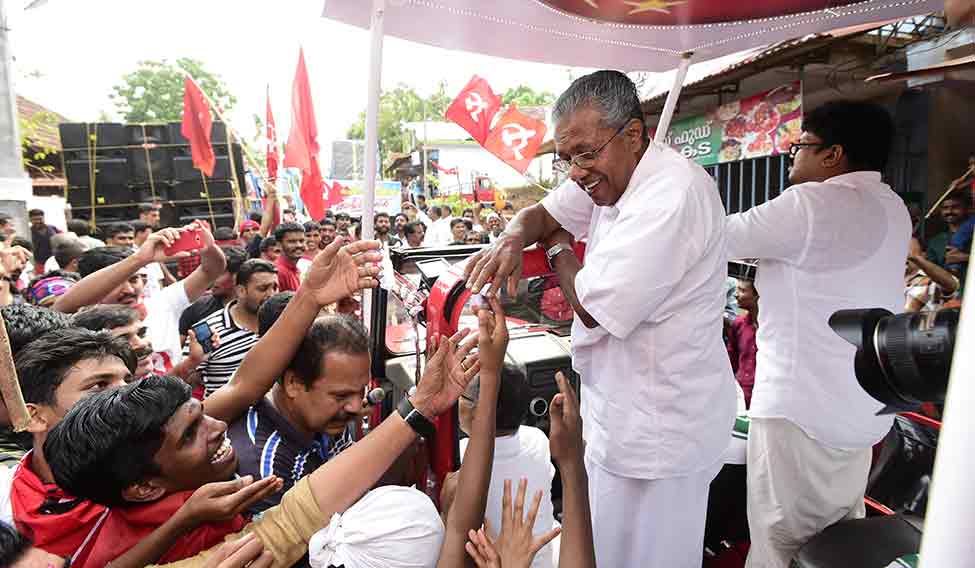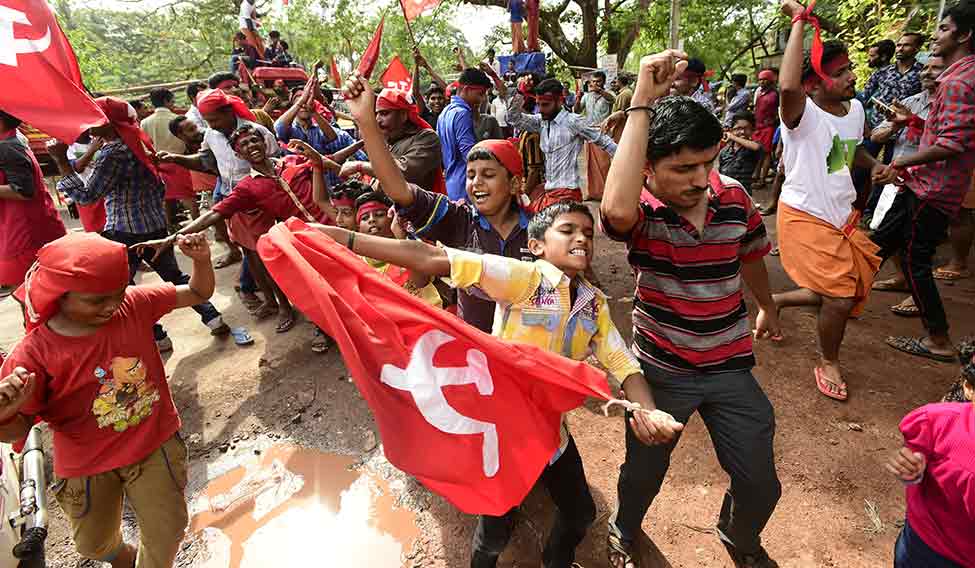When it comes to their political choices, Malayalis have proved once again that they are creatures of habit. Since the advent of coalition politics, anchored by the Congress and the CPI(M) as the United Democratic Front and Left Democratic Front post Emergency, Kerala has never returned an incumbent coalition to power. It kept the tradition intact this time, too, with the LDF winning 91 of 140 seats in the assembly polls. The UDF was left way behind at 47, with four of its ministers, the speaker and the deputy speaker suffering humiliating losses.
Kerala also witnessed something new, something which has never happened in any of the assembly or parliamentary elections in the state. The BJP, finally, showed that it could go beyond local bodies and was right on course of taming its last frontier. Veteran leader O. Rajagopal, who had lost a number of elections in the past, finished on top at Nemom constituency in Thiruvananthapuram district, where the UDF was relegated to the third position.
As counting progressed, tension was palpable at Mararji Bhavan, the state headquarters of the BJP, although Rajagopal was maintaining a consistent and comfortable lead. During the 2014 Lok Sabha polls, he had lost to Shashi Tharoor from a similar position of strength. Finally, around 1pm, a phone call came from the counting centre saying all was well, and the entire compound erupted in delight.
The enthusiasm shown by the BJP workers and the NDA, which came second in as many as seven seats across the state (it lost Manjeshwaram in Kasaragod district by just 89 votes), seemed much greater than what one got to see outside AKG Centre, the CPI(M) headquarters, although the LDF rode a victory wave across Kerala.
While the BJP leaders were understandably emotional, at the AKG Centre, the reaction was measured and assured, reflecting the clinical performance the Left put across the state, retaining its strongholds with increased margins and felling the rival UDF's bastions with knockout performances. The victory was comprehensive, widespread and conclusive, unlike the UDF victory in 2011, and was achieved largely as a result of the unprecedented unity displayed by the top brass of the party, especially opposition leader and the CPI(M)’s mascot V.S. Achuthanandan, and its leading chief ministerial contender and Polit Bureau member Pinarayi Vijayan.
The tiff between the two stalwarts has been a major cause of concern for the CPI(M) over the years. This time, however, the two leaders held their peace. Vijayan shrewdly kept away from limelight, projecting Achuthanandan as the face of the party in campaign rallies, posters and hoardings. The nonagenarian stuck to a punishing campaign schedule even as thousands of voters waited patiently for hours to listen to him. Sometimes, the speeches did not last more than a sentence or two. But those served the purpose and led the Left to a landslide win.
The election results point towards further validation of another interesting phenomenon, which has been evident since the local bodies polls held last year. With the BJP gaining in strength, the Muslim voters seem to have gravitated towards the Left, especially in places where they don't command a sizeable presence. In Muslim citadels like the district of Malappuram, the Indian Union Muslim League, the second largest constituent of the UDF, still enjoys an upper hand (although here, too, the Left performed much better this time), but in most other districts, a Muslim consolidation seems to have taken place in favour of the LDF. This is one of the reasons why the UDF could win only one seat in Thrissur, a district where it used to perform reasonably well in the past. Even Padmaja Venugopal, daughter of former chief minister K. Karunakaran, was defeated in Thrissur constituency, where the Congress used to enjoy an edge.
The LDF smartly used this opening by campaigning vigorously against the BJP, creating an impression that it was better placed to counter the saffron onslaught, which saw the BJP spending liberally to bolster its campaign and pressing helicopters into service. The LDF put up a strong anti-BJP and anti-Narendra Modi front during the beef controversy and the crises that unfolded in JNU and Hyderabad University. It is perhaps the reason why the LDF won a large number of seats with enormous margins.
Vijayan, in fact, called the LDF victory a perfect reply to the communal forces. Intelligent selection of candidates helped the Left a lot. Although some of the candidates saw a lot of opposition from the grassroots initially, the leadership stuck to its choices. Candidates like media person Veena George in Aranmula, actor Mukesh in Kollam, JNU student Mohammed Mohsin in Pattambi and a few rich Muslim businessmen in Malappuram were interesting choices made by the Left, which turned out to be successful.
The LDF also chose its partners well. For instance, while it welcomed the Democratic Kerala Congress, a breakaway faction of Kerala Congress (Mani), and an RSP leader who returned from the UDF, it kept the Forward Bloc out. Although the Democratic Kerala Congress lost all seats it contested, the party seems to have helped the CPI(M) wrest from the UDF some of its traditional seats like Muvattupuzha and Kothamangalam. The Left also managed to keep most of its backward caste flock together, most significantly the sizeable Ezhava community, although BDJS, the party formed by the Sree Narayana Dharma Paripalana Yogam leader Vellappally Natesan, made a concerted push to take the Ezhava votes to the NDA camp. While the BDJS, in alliance with the BJP, showed some spark in its strongholds, it failed to cause any major dent in the Left votes.
The Congress, on the other hand, failed to translate its development agenda into votes. The major achievements of the UDF government like the Kochi Metro, the Vizhinjam port, the Kochi Smart City, the Kannur airport and a number of welfare projects spearheaded by Chief Minister Oommen Chandy, including prohibition and subsidised medical care for the poor, failed to fetch seats. A visible disconnect, which emerged between the government and the party leadership after V.M. Sudheeran took over as state Congress president, took its toll. Sudheeran had been strident in his criticism of the government's policies, and had forced it to roll back many of its decisions, thereby lending credence to the opposition’s charges against the government.
The discord in the Congress worsened when Sudheeran opposed the renomination of a few sitting MLAs. After Chandy threw his weight behind them, the candidate selection process reached a stalemate, which was resolved only after a week-long negotiation in Delhi, hurting the prospects of the candidates in question. Three of the candidates opposed by Sudheeran, including excise minister K. Babu, lost the elections. Babu later said it was hard to win the election when the state Congress president himself did not want him as a candidate.
“The inner-party feud just before the election hurt the party so badly. Moreover, several Congress leaders worked against each other,” said G. Vijayaraghavan, former CEO of Technopark, the largest IT park in Kerala. He said the Congress ended up snatching defeat from the jaws of victory because of the manner in which it functioned over the past one year after it felt the situation was conducive for UDF return.
Equally devastating for the Congress have been the allegations of corruption ranging from the solar scam to the latest land reclamation controversies. Although none of these allegations were proved, the LDF made effective use of them as campaign issues, hurting the chances of several UDF candidates. The Congress was also handicapped by the brutal murder of Jisha, a dalit law student in Perumbavoor, as the police failed to investigate the case properly, let alone nab the murderer. It also brought women's safety to the forefront as a major campaign issue. In his initial comments about the election victory, Achuthanandan acknowledged that women's safety concerns were one of the issues that strengthened the Left wave.
 Red-carpet welcome: CPI(M) Polit Bureau member Pinarayi Vijayan greets supporters in Kannur | Sajeesh Sankar
Red-carpet welcome: CPI(M) Polit Bureau member Pinarayi Vijayan greets supporters in Kannur | Sajeesh Sankar
The consolidation of Muslim votes in the LDF’s favour contributed to the massive losses of the UDF in many constituencies in central and south Kerala. What made the situation worse for the UDF was the loss of some of its traditional Hindu votes to the BJP even as the Left largely managed to keep its vote bank intact and even added a few new sections to it. Congress leaders, including Chandy and home minister Ramesh Chennithala, said the defeat was shocking and hard hitting. Chandy, who maintained that the Congress would win even when the counting started, called the massive defeat unexpected. Sudheeran said while the loss was a major one, the Congress had encountered similar situations in the past and had bounced back. But the steady decline of the Congress fortunes after he became the state president is likely to shake up the party in the days to come.
The BJP has made a strong statement with its victory in Nemom and the seven second place finishes. The party is also pleased about its rising vote share. Said Kummanam Rajasekharan, state BJP president, “There were many people who said we would not open our account in Kerala, that we would never be able to make our entry into the Kerala assembly. The victory in Nemom is a fitting reply to all those people." Vijayaraghavan said neither the LDF nor the UDF could afford to ignore the BJP any longer. Eminent writer T. Padmanabhan also shared the concern. “Both the LDF and the UDF should examine how the BJP grew this much. They should understand the root cause of this growth and work accordingly. It will be crucial for the future of Kerala,” he said.
As the Congress is trying to make sense of its overwhelming defeat, the CPI(M) is moving ahead with government formation. While there is apprehension among party cadres about a Vijayan-Achuthanandan race for the CM's seat, former general secretary and Polit Bureau member Prakash Karat said the party’s state committee and secretariat would meet on May 20 and name the chief minister. As the LDF savours its victory and gets busy with government formation, the UDF, and the Congress in particular, will be ruing its lost chances and sharpening the knives for the inevitable postmortem.
Poll diary
O. Rajagopal, 86, has made history in his 10th electoral battle. The two-time Rajya Sabha member lost nine elections since 1980—six times to the Lok Sabha and three to the assembly.
P.C. George, a maverick Kerala Congress faction leader, has emerged as a rockstar. His brazen ways isolated him, but he demolished rivals with a victory margin of 27,821 votes in Poonjar, Kottayam.
Making history, two Jawaharlal Nehru University students romped home this election—Congress candidate Roji M. John in Angamaly, Ernakulam, and CPI candidate Mohammed Mohsin in Pattambi, Palakkad.






